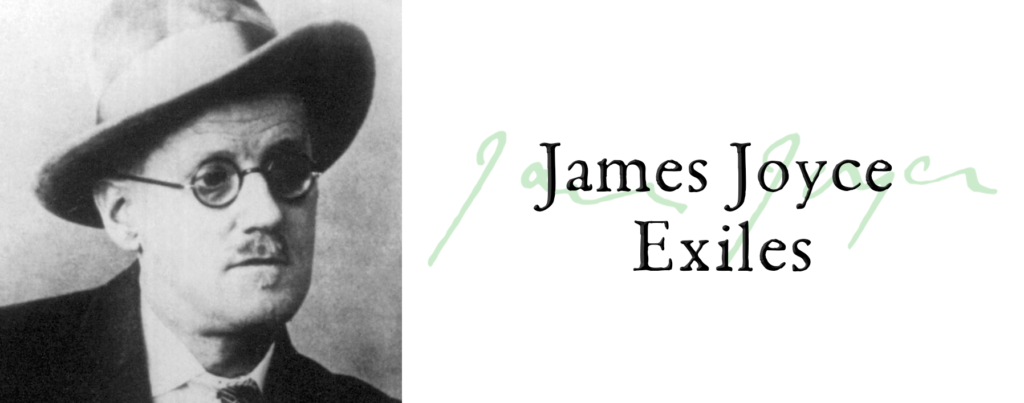Joyce Works: “Exiles”
- At July 07, 2022
- By Great Quail
- In Joyce
 0
0
In “The Dead” Gabriel Conroy yearned for the snows. “Exiles”—an austere ungarnished play—is the epiphany of that pseudo-liberation; its Richard Rowan is a Gabriel Conroy liberated by Ibsen, the Ibsen with whom Joyce had been flirting for a dozen years.
—Hugh Kenner, “Exiles”
Exiles
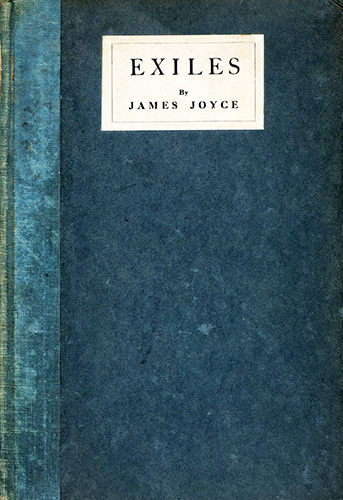
Exiles
By James Joyce
UK: Grant Richards, 1918
US: B.W. Huebsch, 1918
James Joyce was an early and enthusiastic supporter of Henrik Ibsen, the “father of realism” whose controversial plays had shocked the late Victorian world with their frank depictions of sexuality, infidelity, and bourgeois hypocrisy. In April 1900, an eighteen-year old “James A. Joyce” published a glowing review of Ibsen’s When We Dead Awaken in the Fortnightly Review. Ibsen responded with a generous letter; as Joycean biographer Edna O’Brien writes, “for Joyce this commendation was a transfiguration, the moment when he ceased to be an Irishman and became a European.” Joyce responded in kind with a letter of his own: “Dear Sir, I wish to thank you for your kindness in writing to me. I am a young Irishman, eighteen years old, and the words of Ibsen I shall keep in my heart all my life.” Ibsen would continue to influence Joyce over the following years. Joyce began to study Danish, and Ibsen’s name is mentioned in Stephen Hero over twenty times!
Joyce wrote two plays of his own, both strongly influenced by Ibsen. The first was entitled A Brilliant Career, and was modestly inscribed to the artist’s “own soul.” Written in 1900, the five-act play was sent to the theatre critic William Archer, Ibsen’s biggest advocate in the UK, responsible for translating many of his plays into English. According to Joyce’s brother Stanislaus, Joyce himself destroyed the play. Now considered a “lost work,” its existence has been forgotten by everyone but Joyce scholars.
Joyce’s second play was Exiles, “three cat and mouse acts” about artistic alienation, free love, and marital (in)fidelity. Written in 1914, the year that saw the completion of Portrait and the beginning of Ulysses, Exiles was not published until 1918. In many ways, Exiles is Joyce’s hypothetical “Portrait of the Artist as a Middle-aged Man,” a what-if scenario imagining his life had he returned from Italy to remain in Dublin. All the autobiographical elements are there: Richard Rowan, the misunderstood and vaguely disgraced writer; Bertha, his long-suffering common-law wife; and Archie, their Italian-speaking son born out of wedlock. Two romantic entanglements complete the main cast. Richard’s friend Robert Hand is a successful journalist who pleads with Richard to become part of Dublin literary society. Of course, Robert’s madly in love with Bertha, whom he met on the same day as Richard nine years hence, before Richard stole her away to Europe. Then there’s Beatrice Justice, Robert’s beautiful cousin. An old flame of Richard’s, Beatrice teaches music to Archie, and remains awkwardly in love with Richard. This four-way dynamic allows Joyce to stage his most publicly realized fantasies about being cuckolded, as Richard practically throws Bertha into the arms of his best friend.
While this scenario could certainly produce an interesting drama—or at the very least, a rollicking bedroom farce!—in reality Exiles is borderline awful. There’s a reason it draws the most criticism of all Joyce’s published work. First and foremost, Richard Rowan is completely unlikeable. He’s meant to appear fascinatingly aloof and intellectually complex, but he comes across as an arrogant, self-pitying twat. Richard has little regard for the feelings of his wife and friend, viewing them as pieces to be moved around in his weird game of Cuckoldopoly. Meanwhile, Bertha and Robert remain painfully dedicated to Richard, even if they can’t appreciate his art—Bertha doesn’t understand it, and Robert wishes he’d write more popular pieces.
Having an emotionally-stunted monster as one’s protagonist is nothing new, but the remainder of the cast isn’t much more agreeable. Robert Hand is a ridiculous, two-dimensional Horatio, eager to fall on his sword while spouting florid prose about the, uh, passion of passion. (Hugh Kenner famously compared Robert to Wagner, but Wagner’s decadent Romanticism was supported by the genius of his music!) Beatrice Justice is little more than a plot device, her desire to be friends with her lover’s wife the material for a much-better Fiona Apple song. Bertha is the only sympathetic character in the play, torn between her love for Robert and her devotion to her insufferable husband. Although she flings a few accurate barbs at Richard—so at least Joyce knows Richard’s an asshole—her personality feels contrived, an inert blend of coy obedience and frustrating meekness. She spends most of her time being talked at by men who claim to have her best interests at heart. (She’s no Molly Bloom!) And really, after a hundred pages of salacious insinuations, humid innuendoes, and anguished confessions, one wishes the foursome just discovered swinging and got it over with.
Nor does Exiles measure up to Joyce’s usual creative standards. The plot is derivative of Ibsen, but delivered in a mechanical fashion with little complexity or subtlety. Joyce’s overwrought dialogue is painfully artificial, more suited to the page than the stage. There’s also an uncharacteristic lack of humor. Not that Ibsen’s dramas are a chuckle-a-minute, but aside from one solid epigram about statues, Exiles is a self-important slog. Here’s a pivotal exchange between Robert and Richard, where Richard counters his friend’s hyper-masculine notions of passion:
ROBERT
[Rapidly.] Those are moments of sheer madness when we feel an intense passion for a woman. We see nothing. We think of nothing. Only to possess her. Call it brutal, bestial, what you will.
RICHARD
[A little timidly.] I am afraid that that longing to possess a woman is not love.
ROBERT
[Impatiently.] No man ever yet lived on this earth who did not long to possess—I mean to possess in the flesh—the woman whom he loves. It is nature’s law.
RICHARD
[Contemptuously.] What is that to me? Did I vote it?
ROBERT
But if you love… What else is it?
RICHARD
[Hesitatingly.] To wish her well.
ROBERT
[Warmly.] But the passion which burns us night and day to possess her. You feel it as I do. And it is not what you said now.
RICHARD
Have you…? [He stops for an instance.] Have you the luminous certitude that yours is the brain in contact with which she must think and understand and that yours is the body in contact with which her body must feel? Have you this certitude in yourself?
ROBERT
Have you?
RICHARD
[Moved.] Once I had it, Robert: a certitude as luminous as that of my own existence—or an illusion as luminous.
While there’s something moving about Richard’s views of love and passion, as spoken dialogue the lines leave much to be desired. For all Joyce’s attempts at “realism” in his subject matter, his characters speak with a meticulous artificiality, obscuring the (occasional) brilliance or profundity of their insights behind a layer of pomposity. The effect is like getting a glimpse into a precocious adolescent’s diary—it’s hard to see the light when you’re rolling your eyes. Here Robert confesses to an attraction to Richard—or at least, Richard’s genius—that should give psychoanalysts a field day:
ROBERT
[After a pause strikes his forehead with his hand.] What am I saying? Or what am I thinking? I wish you would upbraid me, curse me, hate me as I deserve. You love this woman. I remember all you told me long ago. She is yours, your work. [Suddenly.] And that is why I, too, was drawn to her. You are so strong that you attract me even through her.
RICHARD
I am weak.
ROBERT
[With enthusiasm.] You, Richard! You are the incarnation of strength!
RICHARD
[Holds out his hands.] Feel those hands.
ROBERT
[Taking his hands.] Yes. Mine are stronger. But I meant strength of another kind.
Again, the point is dulled by the cringeworthy dialogue. I can only imagine some post-war wit shouting from the audience, “Get a room!” (Not to mention the ambivalence over the sexism inherent in Robert’s conception of Bertha; whether it belongs to the character or to Joyce himself is never clear.)
Fortunately, Exiles proved to be just a creative misstep between the “scrupulous meanness” of Dubliners and the rich, interior worlds of Ulysses. Aside from a few fans who insist it’s actually a decent play if produced correctly, most critics assign the value of Exiles to the insights it offers into Joyce’s artistic development between Dubliners/Portrait and Ulysses. Other critical plums include the “anxiety of influence” angle regarding Ibsen, feminist critique of Bertha and Beatrice, and examinations of the themes of paralysis and epiphany first established in Dubliners.
But it’s the play’s autobiographical elements that continue to fascinate the average Joycean. Richard Rowan is clearly a projection of Joyce’s fictional life à la Stephen Dedalus and Gabriel Conroy, albeit less sympathetic than either. As Hugh Kenner wrote, “Stephen Dedalus is as much envacuumed as Richard, but sufficient eloquence of Byronic revolt surrounds Stephen to make this fact easy to overlook. Contemplation of Richard Rowan’s unequivocally joyless arrogance makes Stephen-worshippers feel they’ve been had.” Robert Hand is the id to Richard’s prodigious ego, a free-love sensualist who’s lapsed into bourgeois comfort, his instincts dulled by complacency and stasis. Most critics agree he’s a composite character: one part Vincent Cosgrove, Nora’s Dublin suitor, and one part Oliver St. John Gogarty, the long-suffering Salieri to Joyce’s Mozart (and famous “Buck Mulligan” of Ulysses). Robert’s cousin Beatrice may (or may not) have origins in the “dark beauty” that inspired Joyce’s unpublished love poem, Giacomo Joyce. (Although scholars argue her exact identity, she was one of Joyce’s students in Trieste.)
The character that’s achieved the most enduring critical afterlife is Bertha. Given her unconventional role, the fact she’s a female character written by James Joyce, and her real-life inspiration in Nora Barnacle, it’s inevitable Bertha would draw a significant amount of feminist commentary. (There’s also the fact that Joyce criticism has exhausted everything else but Exiles!) For some interesting insights to Bertha, I recommend Ruth Bauerle’s “Bertha’s Role in Exiles” (Women In Joyce), Bonnie Kime Scott’s James Joyce (Feminist Readings) and “Gender, Discourse, and Culture: Exiles” (James Joyce: A Collection of Critical Essays), and Suzette Henke’s James Joyce and the Politics of Desire.
In the end, Exiles remains something of a curiosity in the Joyce canon, revived every so often on stage, then quickly forgotten by everyone but academics. Nevertheless, it offers a fascinating glimpse into what Stephen Dedalus might have become had he not taken that long walk on June 16 and bumped into Mr. Leopold Bloom.
Exiles: Selected Editions
The Portable James Joyce
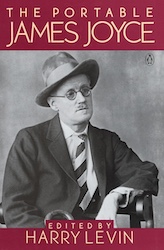
The Portable James Joyce
By James Joyce. Edited by Harry Levin.
First Edition: Viking Press, 1947
Current Revised Edition: Penguin, 1976
This trusty book contains the entire text of A Portrait of the Artist as a Young Man and Dubliners, along with excerpts from Ulysses and Finnegans Wake. More importantly, it contains all of Joyce’s published poetry and Exiles. Not a bad investment, and my recommended first choice.
Exiles (Dover Thrift Edition)
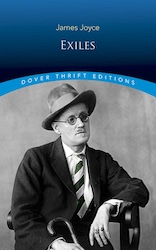
Exiles (Dover Thrift Edition)
By James Joyce
Dover Publications, 2002
We all have a few Dover Thrift publications in our libraries, right? … Right? Don’t expect much and you’ll be fine.
Joyce: Poems and a Play
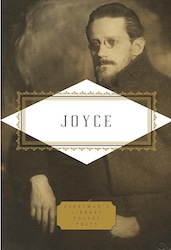
Joyce: Poems and a Play
By James Joyce
Everyman’s Library, 2014
A slim and attractive hardcover, this book contains Exiles along with Joyce’s published poetry. If you’re uninterested in Penguin’s Portable Joyce, this is the version of Exiles to get.
James Joyce Collection: Early Works
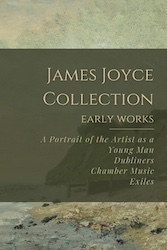
James Joyce Collection: Early Works
By James Joyce
Independently Published, 2021
This bargain volume includes A Portrait of the Artist as a Young Man, Dubliners, Chamber Music, and Exiles. Being independently published, the typography is unprofessional, but not the unmitigated disaster one usually finds in such bootleg endeavors. I just have to call attention to the boilerplate disclaimer unironically inserted at the beginning of the book: “This work is a product of its time and place and may include values, images, events, and language that are offensive to modern sensibilities. Reader discretion is advised.” Ha ha ha! Awesome. Anyway, the Penguin Portable Joyce is still a better choice. Not only does Portable Joyce include everything here and more, it’s professionally edited and typeset.
Exiles (Annotated)
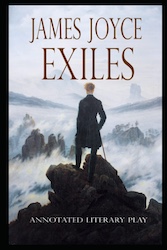
Exiles (Annotated)
By James Joyce
Independently Published, 2021? 2022?
This “annotated” version of Joyce’s, uh, “literary play” features several “essays” on Exiles. To be fair, I haven’t actually read this edition, but skimming through the Amazon excerpts reveals a dumpster fire waiting to incinerate your $20. Sporting amateur typography and lacking italics, the essays appear poorly rendered from another language using Google Translate: “James Augustine Aloysius Joyce become born on February 2, 1882,” or “Exiles is a written play by means of James Joyce that includes three acts; the manuscript changed into written in 1914, finished in 1915, and posted in 1918.” Or my personal favorite: “Washing his palms of any involvement, Rowan is close out in the darkish.” Okaaaay…?
Exiles (Audiobook)
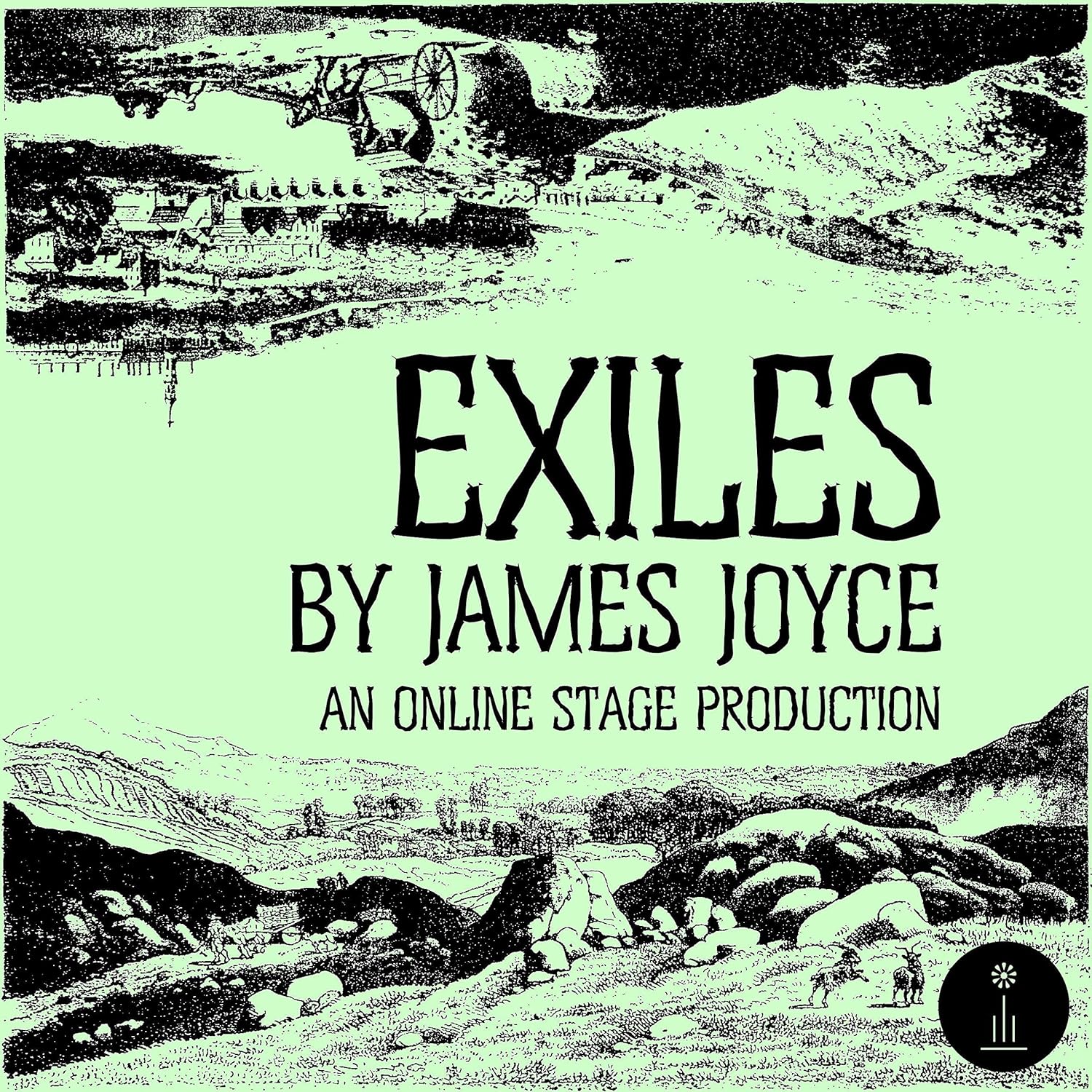
Exiles (Audiobook)
Performed by Lance Rasmussen, Jo Palfi, Elizabeth Klett, Graham Scott, Linda Barrans, Leanne Yau
Spoken Realms, 2021
Unabridged; 2 hours, 37 minutes
This unabridged “online stage production” of Exiles makes a noble effort to redeem the play, but ultimately fails because of questionable casting choices. The set is fully reviewed under “Audiobooks—Drama & Poetry.”
Brazen Head Resources
Exiles Criticism — The “General Joyce Criticism” features a few essay collections with pieces about Exiles.
Additional Information
Exiles Text
The entire text of Exiles is available online at Project Gutenberg.
Revaluing James Joyce’s Exiles
New York Times, 21 July 1946. James T. Farrell examines the influence of Ibsen on Exiles.
The Ogre of Betrayal
The Guardian. 29 July 2006. Edna O’Brien looks at the origins of Exiles in Joyce’s life with Nora and her suitors. She also dishes on the play’s egregious reception—“filth!”
Teenage Joyce’s Beautiful Letter to Ibsen
An informative post by the always-wonderful Maria Popova.
Analysis of James Joyce’s Exiles
A neutral overview of Exiles on Nasrullah Mambrol’s student-friendly “Literary Theory & Criticism” site.
Paywall:
Hugh Kenner: James Joyce’s Exiles
The Hudson Review, Autumn 1952. In this insightful analysis of Exiles, Hugh Kenner sees Richard Rowan as a “wretched” Creator figure, Joyce’s ultimate rejection of both Stephen Dedalus and Ibsen’s “Utopia-at-the-other-side-of-free-love.” Kenner places Exiles as properly following “The Dead”: “As the dramatic mode of the first Joyce cycle, Exiles is the final epiphany of the material organized epically in Dubliners. The dead city tempts the percipient to naked revolt; but the man who abandons the wreckage of the community for an Ibsenite vidda above the snow-line comes to a paralyzing realization of his nakedness, tortured like Richard by the voices of those who say they love him, telling him to despair.”
Joyce Works:
[Main Page | Dubliners | Portrait | Ulysses | Finnegans Wake | Poetry | Exiles | Other Works]
Author: Allen B. Ruch
Last Modified: 12 June 2024
Main Joyce Page: The Brazen Head
Contact: quail(at)shipwrecklibrary(dot)com

